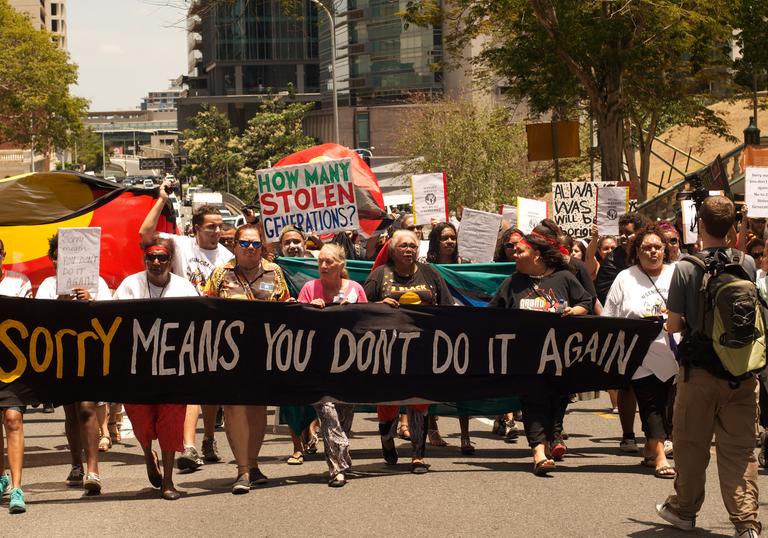Black Holes of Grief: After the Apology @ The Barbican Cinema (Homeland: Films by Australian First Nations Directors Season) Review
‘The decision is made at a higher management level’: archived voice recording of an agent from the Family and Community Service (FACS) in New South Wales, Australia, as they ‘remove’ a child from its mother. These, the chilling opening moments of Larissa Behrendt’s 2017 documentary After the Apology, are a fitting portent of the film to come. In a series which Barbican curator Alex Davidson describes as highlighting ‘the best, most important, most interesting and often the hardest to see’ films from indigenous Australians, After the Apology surely ranks as one of the most harrowingly painful documentaries ever made. Statistics blaze across the screen in black and white for this rare big-screen showing, giving voice to victims and the systematic trauma they have been subjected to.

Behrendt begins with parliamentary footage from 2008 of then Prime Minister Kevin Rudd issuing the eponymous ‘apology’. It is, he says, time to draw ‘a new page’ on the Stolen Generation: over a century of state-engineered violence, separating Aboriginal and Torres Strait Islander people from the culture, support and love of their families. After the apparent hope that apology brings, the film starts to unravel in sickening reverse. Removals have continued under the auspices of the Department of Community Services (DoCS); Aboriginal children are ten times more likely stolen to out of home care; and, most alarmingly, if removal rates continue to increase from the films release to 2025 they will have outstripped the grotesque efficiency of the original programme (which ostensibly ended in the 1970s).
We’re shown through this wasteland of separation by focussing on the stories of four central women, accompanied by judicious, penetrating interviews. It doesn’t have the ‘gotcha’ feel of a Blackfish or a Michael Moore doc, because there’s no secret to uncover. Each removal is public knowledge to seemingly indifferent press and public representatives. One mother has a child taken without warrant and no recourse to appeal for six months. Barbara’s granddaughter simply doesn’t return home from school – the police have picked her up at the playground gates and Barbara gets a phone call the next day.
Most egregiously, the removals are frequently predicated on lies (Stella is removed because, an affidavit reads, she is found playing with dog faeces. Her family does not own a dog.) and when children are occasionally returned, their parents find them with bitemarks, burns, bruises and chipped front teeth. When mothers are allowed to visit children in care, they cannot make any plans to meet up. So, when a daughter begs her grandmother to come home, the grandmother remembers watching, in devastating silence, ‘her little light go out’ as the daughter learnt to believe her own family did not want her back.
Prose necessarily reduces After the Apology to a numbing list of suffering. But the principal achievement of Behrendt’s documentary is allowing each individual story to land like a black hole of grief, subsuming not only parents and children, but aunts, matriarchs and social workers. In the director’s chair, Behrendt demonstrates a deft combination of tight pacing and multi-media artisanship. The four central stories are animated and – a particularly jarring touch – an actor reads testimony facing directly into the camera. It’s also lifted from the depths of despair by the interviewees themselves: eloquent and uncowed in the fact of unspeakable generational misery.
After all that, the ending seems saccharine: all soothing acoustic guitar and interviewees celebrating their children restored. Is this Barbican audience (mostly in tears by now) being let off the hook? Or is something more productive than grief at work? In her recorded introduction to the Barbican screening, Behrendt (who is also a lawyer) makes it clear her documentary is not just a eulogy, but an inspiration and a toolkit. In a landscape of packaged Hollywood sequels and quick-fire culinary entertainment, After the Apology is hard to swallow. But it offers, ultimately, a far more meaningful and tenacious spear of hope than the hollow ‘sorry’ of fourteen years ago.
Review written by Daniel Shailer.
After the Apology was shown on Tuesday 8th February 2022 at the Barbican Cinema as part of the Homeland: Films by Australian First Nations Directors Season. To find out more about the film, visit here…


Leave a Comment